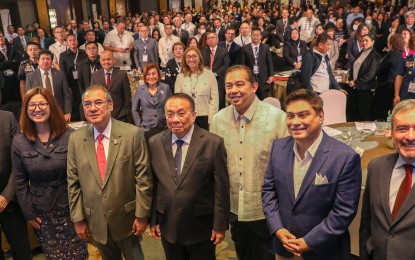
SUMMIT. Supreme Court Chief Justice Alexander Gesmundo (3rd from left), Speaker Martin Romualdez (5th from left), Senate President Juan Miguel Zubiri (right), and other stakeholders during the Jail Decongestion Summit at the at the Diamond Hotel on Wednesday (Dec. 6, 2023). The summit aims to craft solutions to overpopulation in the country's jails and prisons. (PNA photo by Rey Baniquet)
MANILA – Stakeholders in the administration of justice met Wednesday in the Jail Decongestion Summit to craft solutions to overpopulation in the country's jails and prisons.
"First, we will reduce admissions. Second, we will increase releases. And third, we will expand our jail facilities," Supreme Court Chief Justice Alexander Gesmundo said, identifying in broad strokes the planned strategy in addressing the crisis of overpopulation in the penal system.
"This Summit recognizes that the decongestion of our jails requires no less than the full cooperation, coordination, and collaboration among all the five pillars of the criminal justice system -- law enforcement, prosecution, the courts, corrections, and the community," he added.
On the part of the judiciary, Gesmundo said it will continue to introduce technological innovations to enhance the efficiency of court services, reduce delays in case processing and disposition, and increase justice system-wide collaboration.
Meanwhile, Justice Secretary Jesus Remulla, in underscoring the need to resolve the crisis, said overcrowded corrections and detention facilities "compromise the very essence of the corrections system, pose systematic challenged that ripple across our criminal justice system and unduly transgress our PDLs (persons deprived of liberty) basic human rights."
House of Representatives Speaker Martin Romualdez said the chamber is ready to consider and will seriously study several key proposals.
These include a review of crime classification especially those tagged as “capital” and “non-bailable” and the need to overhaul the century-old Revised Penal Code's classification system.
This review will assess the deterrent effect of these classifications and consider the decriminalization of certain offenses like libel, abortion, and dueling.
"Our goal is to ensure that punishments are proportionate to the gravity of the crimes committed," Romualdez said.
He also said they welcome proposals for the enactment of a law that extends diversionary measures to adult offenders or alternatives to incarceration for minor offenses and first-time offenders, reducing unnecessary admissions into the country's penal facilities.
Congress said it will also consider proposals for the Unified Penology Act and Department of Corrections and Penology; a law on reintegration and psychosocial rehabilitation; amendments to the Recognizance Act to make it more accessible and effective.
The lower chamber said it is also considering proposed legislation strengthening the Commission on Human Rights to act as the National Preventive Mechanism against Unjust Incarceration.
On the other hand, Senate President Juan Miguel Zubiri said the summit addresses an overlooked truth that fundamental human rights apply to every Filipino including PDLs no matter the crime and no matter the sentence.
”It is dangerously easy to dehumanize our PDLs and reduce them to second-class citizens. Of course, having done wrong and caused harm, they deserve commensurate punishment. But for all their offenses, they are still human beings; still someone’s parent, partner, sibling, and child. They still deserve an opportunity for growth and change," he said.
The summit was undertaken in cooperation with development partners -- the European Union and the Australian Government through the United Nations Office on Drugs and Crime. (PNA)
